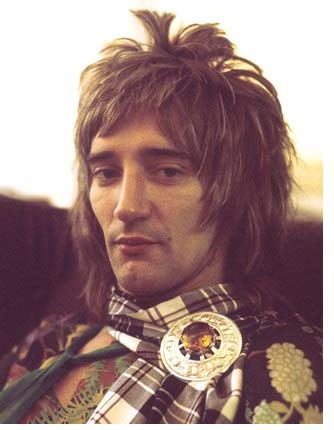
 My father was once quoted as saying, “My entire career I’ve tried to convince people that they don’t have free will… So far I haven’t convinced a single one.” That’s sometimes how I feel about Rod Stewart. I’ve written about him before, but alas, I don’t think it sunk in. Would it help to mention that Paul Westerberg’s favorite album of all time is Never A Dull Moment?! It’s also in my personal top five, for what it’s worth.
My father was once quoted as saying, “My entire career I’ve tried to convince people that they don’t have free will… So far I haven’t convinced a single one.” That’s sometimes how I feel about Rod Stewart. I’ve written about him before, but alas, I don’t think it sunk in. Would it help to mention that Paul Westerberg’s favorite album of all time is Never A Dull Moment?! It’s also in my personal top five, for what it’s worth.
Case in point: The song “Blind Prayer” from his very first solo record, the imaginatively titled The Rod Stewart Album, which also happens to be one of the most stunning debuts in rock history. Stewart’s firing on all cylinders – his singing, his songwriting, and most importantly, his never-been-bettered ramshackle sound – from the very first note of his brash, utterly inspired version of “Street Fighting Man”.
“Blind Prayer” is the third song in, and the first original composition on the record, telling the Job-like story of an orphan street urchin, who loses both his sight and his only friend (his dog Clown), among other tribulations. If it sounds like an Oliver Twist scenario, well, it’s not far off:
The list of setbacks is actually slightly comical, bordering on a parody of traditional blues’ litanies. But the prayer in question seems sincere, having to do with the only good thing left in the protagonist’s life: the girl from up North.
I never knew how much love could hurt me
Good God it ain’t never come my way before
But you know what I’m really trying to say is
God please don’t take her away from me
In other words, as ridiculous as the story may be, the prayer certainly sounds like a genuine cry from the heart. Sure, the orphan sees God as adversarial, but he also sees Him his only recourse. Rod’s vocals make the desperation abundantly clear, striking a note of wistful authenticity that would eventually disappear (almost) entirely.
It helps that his backing band is so transcendent. How a person could not be convinced by Ronnie Wood’s persistent (and incredibly persuasive) argument for slide guitar on this track is simply beyond me. The bass, also played by Ronnie, has a mind of its own in the best possible sense, and Micky Waller’s drumming elevates sloppiness to the sublime. The cumulative effect is a profoundly humanizing one; it’s a picture of a sinner in all his scarred beauty reaching outward and upward, toward a quality considerably less strained than, say, the sexiness for which he would settle in coming years. Rod was looking for mercy – of the Lawd-Have variety. I’m not sure he found it.
Here he is in equally wistful but considerably more good-time mode a few years later:
[youtube=https://www.youtube.com/watch?v=hQqNUwNNkTo&w=600]

COMMENTS
3 responses to “The Blind Faith of Early Rod Stewart”
Leave a Reply













OK Zahl, you young whipper-snapper, in case you didn’t know, the truth is Stewart was at his best when he was with Jeff Beck. Check out “Truth” and “Beck-Ola” when you get a chance. Oh, I forgot about You Tube. Have a listen… http://youtu.be/Rb4LAgJYnOM
But Dave, your frustration, You Wear It Well!
Completely agree, and it’s comforting to find another Rod superfan. I would add that, on the recent Faces box set, that cover of “I’d Rather Go Blind” is another brilliant Rod-and-Ronnie effort. Like you, I hear it and don’t know how you cannot be a huge fan. Certainly, Keith Richards was and is he ever wrong? “You’re My Girl” is similarly great.
All the greats could make happy music, I think. Certainly Rod has/had that gift.